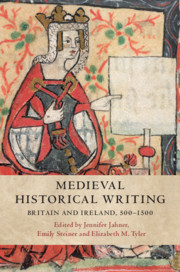Book contents
- Medieval Historical Writing
- Medieval Historical Writing
- Copyright page
- Contents
- Illustrations
- Notes on Contributors
- Abbreviations
- General Introduction
- Part I Time
- Part II Place
- Chapter 8 Mental Maps: Sense of Place in Medieval British Historical Writing
- Chapter 9 Viking Armies and their Historical Legacy across England’s North–South Divide, c.790–c.1100
- Chapter 10 Cross-Channel Networks of History Writing: The Anglo-Saxon Chronicle
- Chapter 11 Creating and Curating an Archive: Bury St Edmunds and its Anglo-Saxon Past
- Chapter 12 Historical Writing in Medieval Wales
- Chapter 13 Scotland and Anglo-Scottish Border Writing
- Chapter 14 London Histories
- Chapter 15 History at the Universities: Oxford, Cambridge, and Paris
- Part III Practice
- Part IV Genre
- Bibliography
- Index
Chapter 8 - Mental Maps: Sense of Place in Medieval British Historical Writing
from Part II - Place
Published online by Cambridge University Press: 19 December 2019
- Medieval Historical Writing
- Medieval Historical Writing
- Copyright page
- Contents
- Illustrations
- Notes on Contributors
- Abbreviations
- General Introduction
- Part I Time
- Part II Place
- Chapter 8 Mental Maps: Sense of Place in Medieval British Historical Writing
- Chapter 9 Viking Armies and their Historical Legacy across England’s North–South Divide, c.790–c.1100
- Chapter 10 Cross-Channel Networks of History Writing: The Anglo-Saxon Chronicle
- Chapter 11 Creating and Curating an Archive: Bury St Edmunds and its Anglo-Saxon Past
- Chapter 12 Historical Writing in Medieval Wales
- Chapter 13 Scotland and Anglo-Scottish Border Writing
- Chapter 14 London Histories
- Chapter 15 History at the Universities: Oxford, Cambridge, and Paris
- Part III Practice
- Part IV Genre
- Bibliography
- Index
Summary
Bede opened his Ecclesiastical History (completed c. 731) with a description of Britain as ‘an island of the ocean, lying at the northwest of the habitable part of the earth, which is bounded by the sea’. He set his narrative of the process by which Christianity was introduced among the peoples of Britain in the context of the Church’s universal mission to take the faith to the ends of the earth, and saw the conversion of the English as the fulfilment of Christ’s last injunction to his apostles. This essay explores the sense of place expressed by medieval English historians. I consider how ideas of place changed to reflect shifts in the political geography of the isles, as the early English kingdoms were united into a single realm (first called Engla lond in the early eleventh century) and then examining the implications of the Norman Conquest, when England became part of a wider Norman empire. Further, the essay considers how English writers perceived and described the relationship between the English and their neighbours, Welsh, Scots and Irish and how the idea of Britain changed over the period. As well as the writings of Bede, I consider the evidence for the idea of place provided by Lives of English saints (both the early lives of Gregory, Wilfrid, Cuthbert and Guthlac but also Lives of the tenth-century reformers Æthelwold, Dunstan and Oswald), the Anglo-Saxon Chronicle and other writings associated with the court of King Alfred including Asser’s Life of the king, the Latin epitome of the Chronicle produced by the tenth-century historian Æthelweard, the Encomium Emmae, and the writings of various twelfth-century English historians including Eadmer, Henry of Huntingdon, John of Worcester, Orderic Vitalis Simeon of Durham and William of Malmesbury. Through their eyes we will see how historians reflected changing political, social, and cultural attitudes towards place and how a writer’s immediate locality and regional identity helped to colour his wider geographical understanding.
Keywords
- Type
- Chapter
- Information
- Medieval Historical WritingBritain and Ireland, 500–1500, pp. 139 - 156Publisher: Cambridge University PressPrint publication year: 2019
- 2
- Cited by

